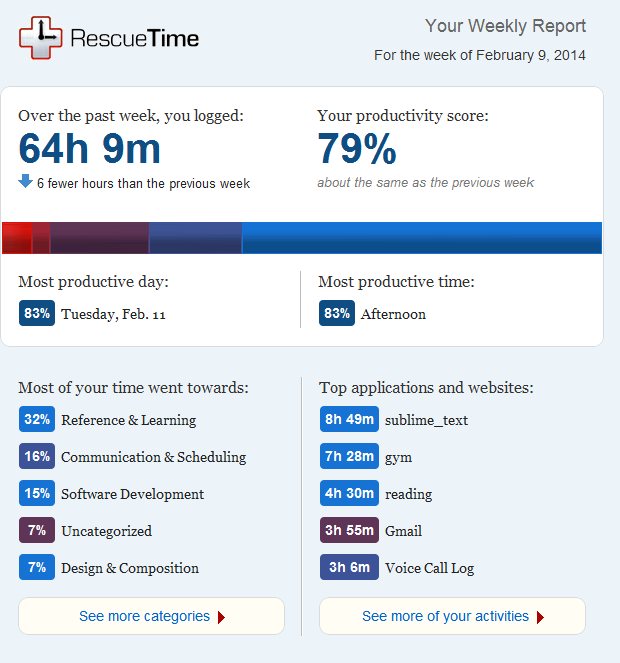You are a Rocketship, This is how you blast off

One of the most important lessons I learned early on was that if you truly value the future, most of your focus should be in the Now. A simple statement, yet we often find our minds shackled by actions of the past or pulled on by a future that hasn't arrived, leaving you with little focus to be in the present. I will show you how I continue to move fast with an organized and productive life with a big emphasis on the present using timelines and a system.
The most important preliminary to the task of arranging one's life so that one may live fully and comfortably within one's daily budget of twenty-four hours is the calm realization of the extreme difficulty of the task, of the sacrifices and the endless effort which it demands. - Arnold Bennett, How to Live on Twenty-Four Hours a Day
Fortunately, living a fulfilling, organized and productive life is easier than planning a mission to space. Getting a space mission off the ground follows some objectives and principles that can be learned from. A space mission could include a technical, scientific or political objective and other synergies. A personal mission would include the mental/intellectual, physical, spiritual, emotional growth objectives of an individual in addition to other areas of purpose or passion.
In a mission to space there is the preparation, planning and design which include: space mission objectives, search and training of flight crew, designing of a spacecraft, collaboration of multi-national parties, getting all these moving pieces to work together and operating on very limited budgets. In life, we can act effectively through planning and prioritization. Our family and friends are our "flight crew" on our journeys through life as they share love, experiences, connection and a sense of greater purpose. We cultivate different skills and passions, to build, connect, innovate and grow as individuals and a society. We interact and collaborate with multiple people on a day to day basis and learn the importance of communication, listening, empathy or other ways to understand each other. We take risks, explore and learn.
NASA's mission is a great endeavor to explore the vastness of space and to go beyond our perceived reach. As human beings limited by both time and resources, we must not be afraid to explore the vastness of our minds and capabilities.
Timelines and Systems
Complex things can be broken down into their most simplest forms where they can be much easily handled and understood. Having great ambitions and ideas and moving through a world that is ever changing can be handled more effectively by incorporating systems within our lives to break down complex concepts or situations into manageable components spread out over time. Rather than focusing on goals, I put my energy into developing a lifestyle, process and systems around the things I want to accomplish and the person I eventually want to become. Putting emphasis on the present, I partake in daily battles which consist of executing my system and daily habits. For a particular day I execute my daily objectives, 80% of my attention is on the current day and being alert and sensitive towards dynamic shifts in the week that could affect plans that I have for the following day. Another 20% is on my monthly projections and objectives and missions from quarterly and annual reviews. The monthly, quarterly and annual stages also provides me with aggregate data on my past actions so I can spot trends be informed if I am on correct course or if there are areas of improvement or other changes to make sure I'm back on track.
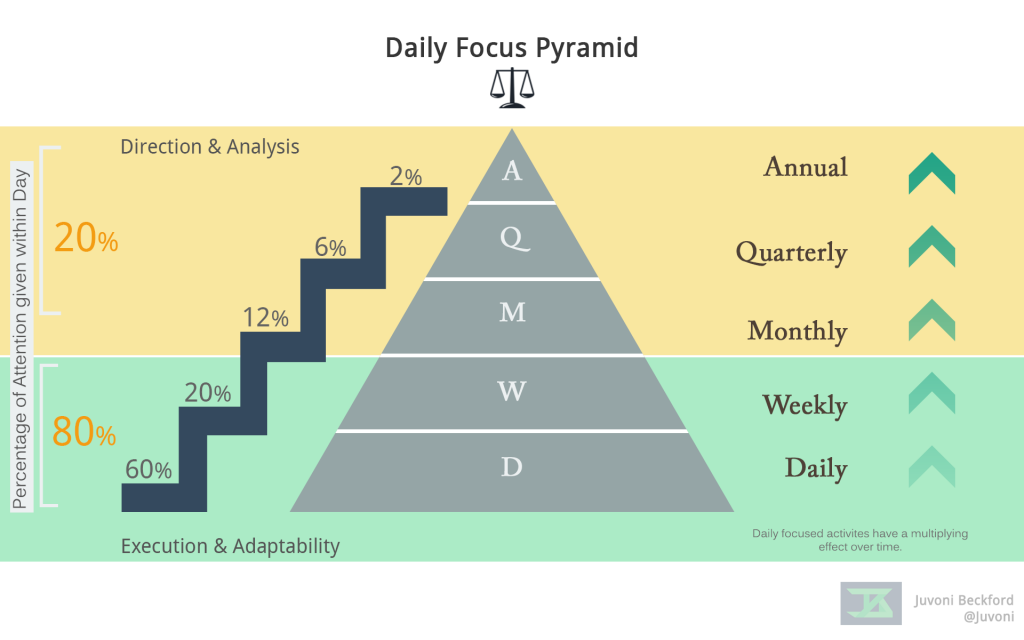

Year End Milestones
It is important to have an outlook for what you want to accomplish for the year so you can have some sense of purpose and direction as the year goes on. Having an end in mind makes it easier for you to shape the present and adapt to changes as necessary to ensure you reach your milestones.
“One way to define wisdom is the ability to see, into the future, the consequences of your choices in the present. That ability can give you a completely different perspective on what the future might look like.” - Andy Andrews, The Noticer: Sometimes, All a Person Needs Is a Little Perspective
Identifying priorities
Important questions to ask yourself at this stage:
- What do I want to accomplish?
- Why do I want to do it?
- How will I go about doing it?
Based on similar annual reviews from James Clear and Nathan Barry, here are some important questions to ask yourself in an annual review that will be useful:
- What went well this year?
- What didn't go so well this year?
- What am I working toward?

Quarterly Reviews
Once you have a big picture idea of what you want to accomplish and some starting points to go about achieving them, you should go about breaking them down and spacing them out overtime in manageable blocks. You can base this on your current time commitments, priorities and other adjustments within a 3 month time frame. An effective way to organize and determine priorities is establishing the pillars in your life. These are the big rocks which you place in first in you glass jar with limited space (time) followed by the small rocks (less important and non-urgent matters). Some examples of important pillars are:
- Personal
- Health
- Relationships
- Professional
- Financial
Samantha Smith, a contributor for Forbes, wrote a great piece on evaluating priorities and setting goals. The next 2 self-awareness and introspective methods will help you reduce friction and bottlenecks in your life. These should be done at least quarterly and at most once every two weeks. Timothy Ferriss, an American author, entrepreneur, angel investor, and public speaker, known for his popular books 4-Hour Workweek, 4-Hour Body and 4-Hour Chef wrote about these methods that he does to make himself more efficient, effective and to take more risks.
80/20 Analysis
- Look at the 20% of activities and people that are producing 80% of the results and positive states that I want.
- Then look at the 20% of the activities and people that are producing 80% of the negative/problems states or results.
- Look at the 20% of activities or people that are taking up 80% of my time.
Then get the results of the analysis to put together a to do list and a not to do list for the things that if changed would be a very big positive force multiple and then the things that if not changed would be a major hindrance.
Fear setting
Why you haven't done the most important To Do and why you are doing the Not To Do. (Specify your fears)
-
Write down the worst thing that could happen
-
Write down the things you could do to minimize the impact of the above
-
All things you can do to get back to where you are now if it happened
These will help you dedicate more of your time to high leverage activities and do more things outside of your comfort zone by planning for failure and taking calculated risks.

Monthly Projections
At the start of the month I'll do a projection of what I hope to accomplish and what my priorities for the month should be. I will also review some trends for the month such as spending habits, browsing habits with RescueTime and review the health of the consistency of my daily habits that I am working on. If I am inconsistent with certain habits and that habit is still a priority I won't drop it, instead I'll divert more attention and try to understand why I am failing. I'll then use my failures as information that I can use to plan for failure in the future. An example would be mapping out the optimal times, environments and conditions for certain habits and if I know that a certain habit is at risk I will plan ahead to maneuver my schedule to create an opportunity to succeed.

Weekly Forecasts
I set out a day to schedule how much time I'll have to work with for the following week Mon- Sun. Sunday I'll spend anywhere from 20 minutes to 1 hour and review my calendar, tasks for the month, potential topic areas and things I want to learn.
Main Areas I'll take into account for time estimates
- Work Commitments
- Family Commitments
- Any engagements with Friends
- Fitness Schedule
- Estimated Energy Levels based on the above
- Period of the day in which I will have available time
- Daily Habits
- Buffer time to account for natural or unexpected errors in time judgment
Example my Week of Feb 24th Forecast:
Mon:**1.5hrs** Tue:**1.5hrs** Wed:**0.5hrs** Thur:**2.0hrs** Fri:**4.0hrs** Sat:**4.0hrs** Sun:**7.0hrs**
_20.5 Total hours to invest_
RescueTime gives a good weekly snapshot of my online activity and some offline ones I've specified. This in combination with my pomodoro helps me to validate the week and plan for the next.
It also allows you to set goals and enables you to more effectively manage your online activities more effectively and efficiently.
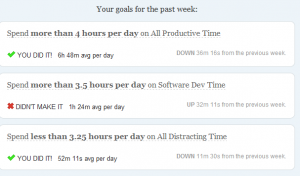

Mission Launch – The Day
Now everything is coming together and the real battle begins. It is the day, the current day, which a past you should have prepared, scheduled, delegated and sacrificed for to provide you with the environment, resources and additional information for you to win the battle today. It's time to execute and get S*!t done.
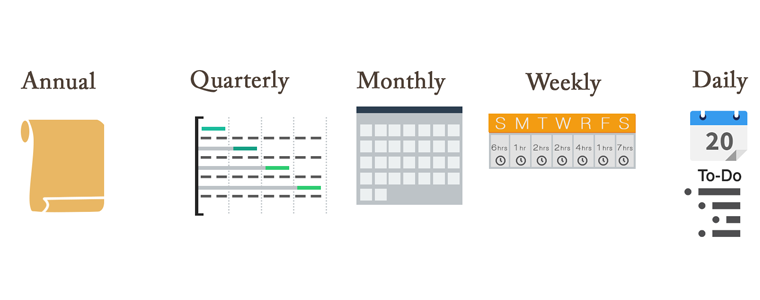
Daily Objectives
“But until a person can say deeply and honestly, "I am what I am today because of the choices I made yesterday," that person cannot say, "I choose otherwise.” ― Stephen R. Covey, The 7 Habits of Highly Effective People: Powerful Lessons
My main tools for getting things done daily are:
Bullet Journal
Bullet journal is a method for quickly capturing and organizing many types of data that you are trying to absorb on a daily basis. This kind of journaling helps you to set priorities and take snapshots of important events, ideas or other notes that can help you take your productivity to the next level.
After I've done my weekly forecast I will look at a series of collections of tasks I want to accomplish and schedule them out based my the results of my forecast for the whole week into bullet journal. On a day by day basis I'll review what I scheduled for myself and mark off what I've completed as well as insert any extra notes, events or other indicators.
An important differentiator is that I don't schedule out my day on a day to day basis, I try to accomplish all I can in advance to shape an environment and create a runway for me to just focus on execution for that particular day. This leaves you with very little wondering what to do for the day and more focus on what must be done.
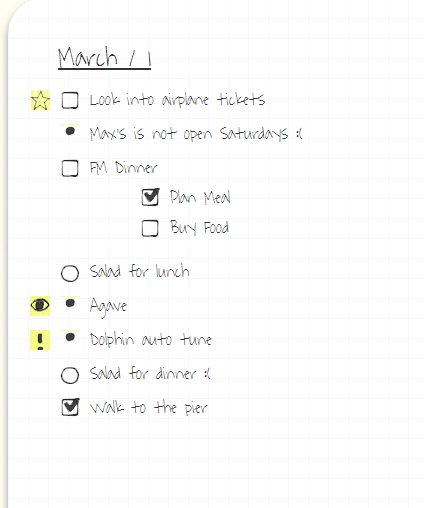
Bullet Journal | bulletjournal.com
Wunderlist (to be updated - Wunderlist was discontinued)
Wunderlist is an easy and intuitive way to create and manage to-do lists.
Wunderlist's strength is in its delicate balance between simplicity and functionality. There is very little friction when using wunderlist and it serves a vital function in helping me catch dynamic tasks, topics or ideas and filter them into a variety of lists with the ability to add additional notes, subtasks, reminders and additional priority flags.
Using Wunderlist in combination with Bullet Journal enables me to reduce the noise in my bullet journal so it can have much more focus and that in turn has made it easier to use the bullet journal more consistently.
Some important lists I've created in my Wunderlist are:
- Short-Term: Task within a short-term time frame of medium to high priority.
- Mid-Term: Tasks within a long-term time frame of low to medium priority.
- Foundation: A collection of techniques and methods such as the 80/20 analysis and habits with reminders set
- Learning/Topics: A focused collection of things I am learning and currently want to learn with sub lists to resources to learn them and simple notes
Pomodoro Technique
The Pomodoro Technique is a productivity method that utilizes timed intervals of working periods of 25mins for one pomodoro with an accompanying 5 minutes of break and after the 4th completed pomodoro you can take a 15 minute break.
The pomodoro technique helps me to train my focus and time box tasks.
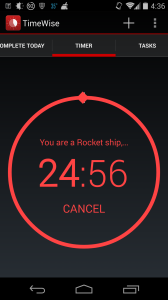
Timewise Android Application
Benefits I receive from using pomodoro:
- Workflow consistency
- Increased productivity on average
- Ability to time box tasks, preventing any one particular task from becoming a bottleneck
- Learned experience of how long a particular task will take
The particular Android application I use is TimeWise (to be updated - TimeWise was discontinued). If you know a good iOS or web equivalent comment down bellow and I will update this post as well as credit the recommender.
Here are some great features and additional information I receive:
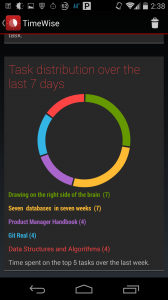
Evernote
Evernote is a note-taking software that I utilize heavily as a life long learner. I try to create a system around dumping as much as I can from my memory into evernote so I can have more focus and agility when thinking.
iDoneThis
iDoneThis is a simple email-based daily productivity tracking web application. I record my daily completed tasks and get additional information about 1 week, 1 month, 3 month and 6 month task anniversaries for added emphasis of where I've been.
iDoneThis 1 month word cloud example:
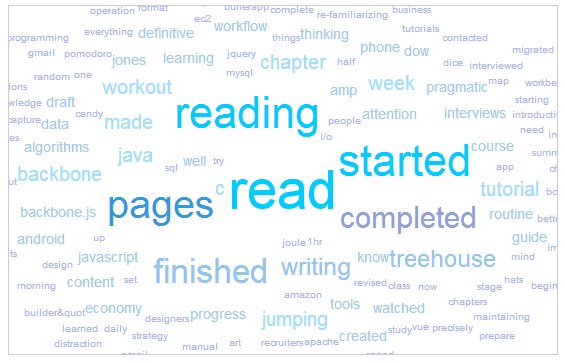
Daily Habit
The daily habit is the sign of an ambitious individual. Developing a system and series of routines displays consistency and focus which will have a compound effect over time.
Embracing repetition means changing your mindset; instead of viewing it as a chore, view it as your most powerful tool. As the martial artist and actor Bruce Lee said, “I fear not the man who has practiced ten thousand kicks once, but I fear the man who has practiced one kick ten thousand times.” - Coyle, Daniel. The Little Book of Talent: 52 Tips for Improving Your Skills
Now go forth and take flight. Soar to your potential and let your ambition shine through the skies.
Feel free to comment down below or contact me. Share if you found this helpful.
